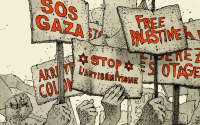Published on Thursday, June 3, 2004 by Knight-Ridder Tom Lasseter |
BAGHDAD, Iraq - Lakhdar Brahimi, wrapping up his U.N. mission to bring an interim government to Iraq, looked a little tired and disheartened Wednesday as he said the compromise he negotiated was the best possible under American control. When the U.S.-appointed Governing Council announced this week that it had selected a new prime minister, Brahimi seemed to be caught flat-footed. The man tapped for the post, Iyad Allawi, has close ties to the CIA. Almost immediately after being named prime minister, he called for the United States to keep its troops in Iraq, a position unpopular with many Iraqis. Asked how big a role the American administration had in forming the government and selecting the prime minister and president, Brahimi reminded reporters that American Ambassador L. Paul Bremer runs things in Iraq. "Bremer is the dictator of Iraq," he said. "He has the money. He has the signature." He later added: "I will not say who was my first choice, and who was not my first choice ... I will remind you that the Americans are governing this country." Sadoun al Dulame, the head of a Baghdad research organization and polling center, said he spoke with Brahimi last week and that the diplomat was discouraged. "He was very disappointed, very frustrated," al Dulame said. "I asked him why he didn't say that publicly (and) he said, `I am the U.N. envoy to Iraq, how can I admit to failure?'" Brahimi arrived in Iraq in February with orders to evaluate whether elections were feasible in the short term and, if not, to find an alternative. A vague U.S. caucus plan had fallen through because of opposition from Iraq's top Shiite Muslim cleric, Grand Ayatollah Ali al Husseini al-Sistani, who demanded either elections or U.N. involvement. Tens of thousands of Shiites had marched through Baghdad the month before, many of them threatening violent revolt if there were no elections. It was a daunting stage for diplomacy, even for Brahimi, a former minister for foreign affairs of Algeria whose diplomatic career stretches back to his days as a National Liberation Front representative in 1956, during Algeria's struggle for independence. Brahimi spent a lot of his time in Iraq listening to Iraqis from all walks of life and pieced together an expansive, nuanced picture of the nation and its needs. He concluded that immediate elections wouldn't work. He then went to the table with U.S. administrators and the nation's interim Governing Council for weeks of negotiations that involved sharp dissent, political jockeying and leaks to the press. In the end, a new government formed, announcements were made and even al-Sistani, according to reports from Najaf, accepted the result. Reflecting on it all, Brahimi said it was "a sometimes extremely difficult negotiation process" and added, "You in the press had a field day." After he finished speaking, he walked off from the podium, alone. A U.N. banner was tacked on the wall behind him, waiting to be taken down and replaced by the Americans in time for the next news conference. |
http://www.commondreams.org/cgi-bin/print.cgi?file=/headlines04/0603-01.htm






